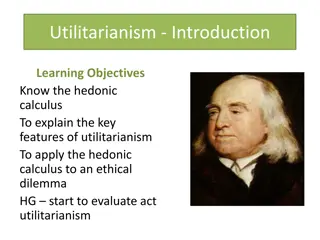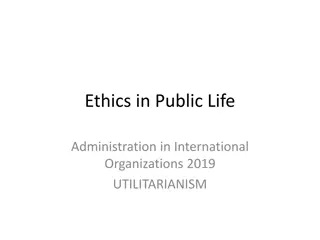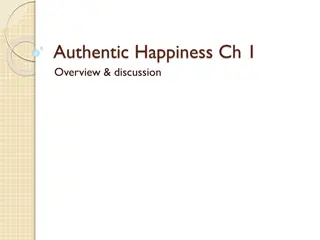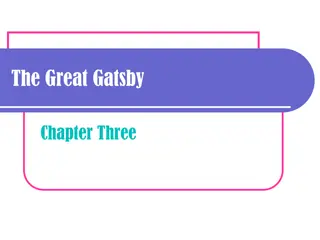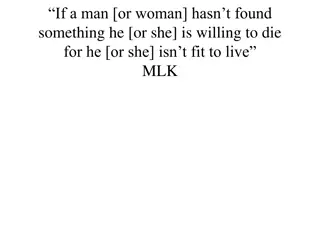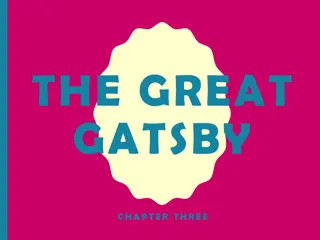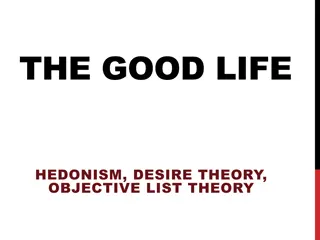Understanding Utilitarianism: A Comparative Analysis
Utilitarianism, as introduced by Jeremy Bentham, focuses on maximizing pleasure and minimizing pain to determine the ethical value of actions. Bentham's development of the hedonic calculus and the principle of utility are key components of this consequentialist theory. Influenced by hedonism and dri
0 views • 17 slides
Jeremy Bentham and Utilitarianism
Jeremy Bentham, a late 18th-century British philosopher, introduced Utilitarianism, a moral philosophy focused on maximizing happiness and minimizing pain. He believed that all actions are motivated by pleasure and pain, and that the principle of utility judges actions based on their impact on happi
0 views • 17 slides
Understanding Utilitarianism: Consequentialist Ethics in Public Life
Utilitarianism, a consequentialist theory, evaluates the moral worth of actions based on their outcomes. This approach, exemplified by classical utilitarianism of Bentham and Mill, prioritizes maximizing overall happiness or utility. The philosophy emphasizes the principles of consequences, utility,
0 views • 14 slides
The Power of Authentic Happiness: Understanding Seligman's Research
Explore the insights from the book "Authentic Happiness" by Martin Seligman, as it delves into the links between optimism, happiness, and longevity. Discover the limitations of hedonism, the importance of gratification over pleasure, the value of strengths across cultures, and Seligman's formula for
0 views • 8 slides
Understanding Hedonism: The Pursuit of Pleasure in Ancient and Modern Philosophies
Explore the concept of hedonism, where pleasure is considered the ultimate good in life. From ancient Greek philosophers like Epicurus and Aristippus to modern thinkers like Bentham and Mill, delve into the ethical implications and criticisms surrounding this philosophy. Understand how hedonism shap
0 views • 13 slides
Decadence and Hedonism in Chapter Three of The Great Gatsby
In Chapter Three of The Great Gatsby, Fitzgerald vividly portrays the decadent and wasteful hedonism of the Jazz Age through Gatsby's extravagant parties. The chapter unfolds with a grand party at Gatsby's mansion, showcasing the opulent lifestyle of the era. Guests, akin to moths fluttering towards
0 views • 29 slides
Wisdom and Reflections on Life
Thought-provoking quotes and images that delve into the essence of life, including the importance of finding purpose worth dying for, the impact of discipline, the power of persistence, and the balance of inspiration and hard work. The content also touches on hedonism, the consequences of unhealthy
0 views • 8 slides
Decadence and Wastefulness in The Great Gatsby - Chapter Three
Chapter Three of The Great Gatsby delves into the decadent and wasteful hedonism of the Jazz Age, epitomized by Gatsby's extravagant parties filled with rowdy parasites. Through vivid imagery and symbolism like moths and excessive consumption, Fitzgerald critiques the artificial rush and emptiness o
0 views • 24 slides
Exploring The Good Life: Hedonism, Desire Theory, and Objective List Theory
Delve into the concepts of Hedonism, Desire Theory, and Objective List Theory to understand what constitutes a good life and the pursuit of well-being. Explore different value theories, the debate between subjective and objective values, and the philosophical perspectives on happiness and pleasure.
0 views • 60 slides
Evaluation of Nozick's Experience Machine Thought Experiment
Nozick's Experience Machine Thought Experiment explores the choice between a machine providing endless pleasure experiences and real-life existence. The debate centers on the value of living a fabricated reality versus embracing challenges and uncertainties in the pursuit of genuine fulfillment. Whi
0 views • 10 slides
